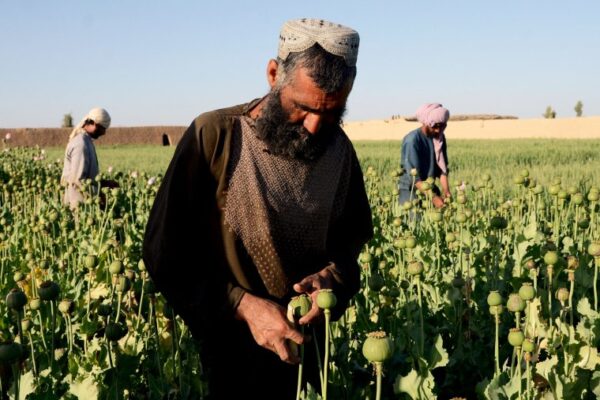
Taliban announce ban on poppy production in Afghanistan
The Afghan Taliban decision announced a week’s ban on poppy production, even when farmers throughout the country began harvesting bright red flowers that produce opium used to make heroin.
The order warns farmers that their plants will be burned and they can be imprisoned if they continue harvesting. This ban reminded the previous Taliban rules in the late 1990s when religious-based movements prohibit poppy production. At that time, the ban was staggered and implemented throughout the country within two years. U.n. Verified that production has been eradicated in most countries.
However, after their Ouster in 2001 the farmers in many parts of the country were reported to be plowing in their wheat fields – which were almost impossible to be brought to the market due to lack of roads and infrastructure – and returned to poppy production.
During the last years the Taliban government, wheat rot in the fields because farmers cannot bring them to the market for sale and are based on flour.
Poppies are the main source of income for millions of smallholders and daily workers who can obtain an upwade of $ 300 a month to harvest it and extract opium.
Today, Afghanistan is the largest opium manufacturer in the world and in 2021, before the Taliban takeover, produces more than 6,000 tons of opium, which is a report from the office u.n. On drugs and crime says it can potentially produce 320 tons of pure heroin.
Afghanistan produced more opium than all the opium producing countries combined and last year were the sixth year in a row of opium records. That is the problem even as the US and international community spend billions of dollars to eradicate poppy production. The Taliban is reported to make millions of dollars impose taxes on farmers and middle people to move their medicines outside Afghanistan and senior government officials supported by A.S. involved in developing drug trafficking.
Washington spent more than $ 8 billion trying to eradicate poppy production in Afghanistan for almost 20 years of war, which ended with the return of the Taliban in August.
Nearly 80% of the heroin produced from the production of opium Afghanistan reached Europe through Central Asia and Pakistan.
In a very poor Afghanistan, the prohibition of poppy production will further impoverish the poorest citizens.
According to the report u.n. In 2021, the income from the opiate in Afghanistan was $ 1.8 to $ 2.7 billion, more than 7% of the country’s GDP. The same report said the “forbidden drug supply chain outside Afghanistan” produces more.
The ban on the Taliban came when the country faced a humanitarian crisis that spurred U.N. To request $ 4.4 billion last month because 95% of Afghans did not have enough to eat. The prohibition, while hitting a hard medicine production house, it is likely to destroy small farmers who depend on their opium production to survive. It is difficult to know how the Taliban rulers will be able to create replacement and financing plants for Afghan farmers because their economy in free autumn and international development has stopped.
Poppy production and income are often used as a form of banking among the poorest people in Afghanistan which uses the promise of harvest next year to buy a staple such as flour, sugar, cooking oil and heating oil.
The decision also prohibits “transportation, trade, export and importing all types of narcotics such as alcohol, heroin, tablet K, hashish … drug manufacturing factories in Afghanistan. Strictly prohibited.”
When the last Taliban ruled, they employed elders of villages and scholars of the mosque to enforce the ban and in villages that ignored the ban, the Taliban arrested the elders and scholars, and offensive farmers. As a result, the elders and scholars were given incentives to prevent poppy production in their area.
Taliban spokesman Zabihullah Mujahid announced the ban at a press conference in the capital.

